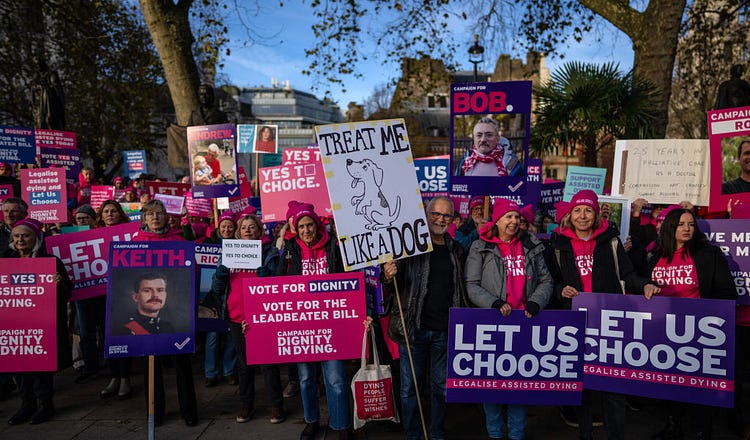
Welcome back to Letters to the Editor. Today, we bring you readers’ thoughts on assisted suicide, legal psychedelics, and humane meat consumption.
We are committed to facilitating robust debate in our pages. If you have thoughts on something we’ve published, we want to know. Please write to us at letters@TheFP.com.
On November 27, we published a piece about the UK’s assisted suicide bill, “Should a Government Help People Die?” The author, Madeleine Kearns, interviewed multiple opponents of the bill—which has since passed—including Jamie Hale, a 33-year-old Brit who needs a wheelchair and relies on partial ventilation and round-the-clock care. Here, longtime reader Navin Dadlani responds:
I wanted to share my thoughts on the piece about assisted suicide, “Should a Government Help People Die?” The content of that article has been bothering me since I read it. The piece begins by talking about Jamie Hale’s concerns that he will face pressure to kill himself if the new law comes into force. It then argues that other vulnerable people, such as the “disabled, poor, and depressed,” will soon come under pressure to die from unscrupulous relatives or unprincipled doctors. There is a brief acknowledgment that this legislation might be good for people who are suffering and close to the end, but then this idea is rapidly dismissed by saying the death might not be as peaceful as they would like, and maybe they wouldn’t want to die anyway if someone actually paid attention to them. Finally, the question is asked: Isn’t this all just a way to save money for an NHS under pressure? The argument boils down to “They are doing this to save money, and if only we were more generous to those who needed all this extra care then we wouldn’t be so heartless to contemplate this.”
Let me give you the counterargument. When people are at the end of their lives, sometimes they suffer. Sometimes they have had a terrible illness that has taken away their health and their ability to enjoy their lives, and all they are left with in that hospital room is pain and the promise of an inevitable, excruciating death. And all their loved ones can do is watch helplessly. This is the daily and common reality that the bill is meant to address, not the cases where people are a burden on the state and might feel pressure from unprincipled people to end their lives.
I’ve been in that hospital room, and I’ve watched someone I love die from a terrible illness. If you’re going to tell stories to illustrate what this bill is meant to do, then you cannot just report the stories of the people opposed to the bill; you also have to tell the stories of the people who support it. Where were those stories in your article? Where is the dying grandfather who cannot suffer the pain anymore, or the distraught relatives who cannot bear to watch the person they love in daily agony?
Whether we want to admit it or not, people ask their doctors to end their lives every day when they are close to death. Doctors will increase the morphine or find other ways to let them slip away. Without this bill, those doctors and those families have terrible choices—the doctor is a murderer or the family watches their loved one continue to suffer. Ask anyone who has watched a loved one die from a long and painful illness. They might tell you that when death came, it was a relief for everyone because they knew the person they loved had finally found peace.
On November 21, we published a piece by Charles Fain Lehman about the fight to legalize psychedelics. In it, he investigates the reasons behind the FDA’s recent rejection of a proposal—from Lykos Therapeutics—to market the drug MDMA for the treatment of post-traumatic stress disorder. Critics of Lykos argue that part of the problem is that many of the drug’s advocates care less about its medical potential than, to quote one, “getting high and partying in the woods.”
After reading the piece, two Americans who are deeply knowledgeable on this subject got in touch to share their perspective. Joe Green is co-founder and chairman of the Psychedelic Science Funders Collaborative, and serves on the board of the Multidisciplinary Association for Psychedelic Studies. Genevieve Jurvetson serves on the former organization’s board of directors and is the co-founder of The Jurvetson Foundation, which researches new ways to treat mental health and end veteran suicide. Here’s what they wrote:
The recent article “The Great American Acid Trip” misses the fundamental point about MDMA-assisted therapy: This isn’t about counterculture—it’s about saving lives. Since 9/11, over 150,000 American veterans have died by suicide—that’s 21 times more lives than lost to combat. Behind each death is a story of profound suffering that our current medical system has failed to address.



